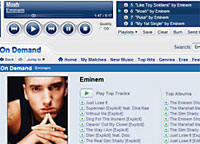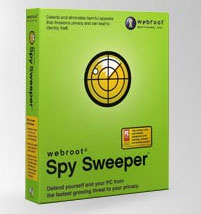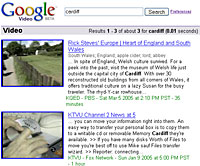 Yahoo has slapped a king-sized gauntlet on the floor as it announced plans to roll out an aggressively-priced online music service.
Yahoo has slapped a king-sized gauntlet on the floor as it announced plans to roll out an aggressively-priced online music service.
The new service, unsurprisingly dubbed Yahoo Music Unlimited, will give downloaders unlimited access to over a million music tracks for US$6.99 (~£3.70 ~€5.42) a month, or, alternatively, for US$60 (~£31.86 ~€36.58) a year.
The service, which also lets users transfer the songs to compatible portable music players, massively undercuts its rival’s services.
RealNetworks, for example, charge a comparatively hefty US$179 (~£95 ~€139) a year for a near-identical service while Napster charging US$14.95 (~£7.95 ~€11.60) a month for a portable music subscription service and US$9.95 (~£5.25 ~€7.72) a month without the portability option.
“We look at subscriptions as a way to get people to pay as little something for digital music as opposed to ripping their own CDs or stealing music.” Yahoo Music General Manager David Goldberg said.
Yahoo hopes that the low, low, low price is designed to get users hip to the subscription music model, which allows consumers to play downloaded music and “streamed” tracks whenever they want — as long as they keep shelling out for the privilege.
Just like Napster’s similar service – which offers a similarly vast online music library – the second a customer’s cash flow stops, their opulent oasis of a record collection will rapidly turns into a tune-free desert.
Yahoo’s price pruning bonanza looks set to spur further expansion of the online music business, which despite huge growth still only accounts for about 2% or less of total music sales, according to analyst estimates.
 Yahoo’s hugely popular Website – visited by 100 million US users every month – should give their music service a big head start, with the company being able to let rip with the kind of massive marketing muscle that few online music rivals can match.
Yahoo’s hugely popular Website – visited by 100 million US users every month – should give their music service a big head start, with the company being able to let rip with the kind of massive marketing muscle that few online music rivals can match.
“It’s a hugely aggressive move, a shot in the arm to the subscription notion,” says David Card, an analyst at Jupiter Research, predicting subscription revenue will be larger than downloads within a few years, from roughly equal shares today.
iTunes, the current online music market leader, provides a different service, preferring to charge users on a song or album download basis, with Apple previously being critical of the subscription model.
Some suspect that they may be pressured into adopting a similar offering once Yahoo’s PR machine rolls into action.
Although it’s generally accepted that subscription services are more lucrative than charging per download, some analysts are wondering whether Yahoo will actually be able to make any dosh at the US$60 (~£31 ~€46) annual subscription level.
Yahoo’s David Goldberg has expressed confidence that the service will be profitable, although conceded that the company could eventually raise its fees. He’s been a bit sketchy with the small-print details too, but says Yahoo will pay music labels royalties linked to its revenue and subscriber numbers for the service.
 Yahoo’s subscription service will work with selected portable MP3 players that use Microsoft’s digital-music format – there’s currently around compatible 10 devices available, including Dell’s DJ player and Creative Technology’s Zen Micro.
Yahoo’s subscription service will work with selected portable MP3 players that use Microsoft’s digital-music format – there’s currently around compatible 10 devices available, including Dell’s DJ player and Creative Technology’s Zen Micro.
Owners of compatible devices will have to install new software on them to be able to use the service, with newer models offering built-in compatibility.
Apple may be slightly perturbed to learn that the Yahoo’s service will not work with their iPod, despite it being the biggest selling digital music player on the planet and probably elsewhere.
Yahoo’s testosterone-charged move reflects their determination to grab a Brobdingnagian chunk of the online music pie, with the company splashing out US$160 million (~£85m ~€124m) last year to acquire MusicMatch, a company already offering a song/album download deal with a non-portable subscription service.
MusicMatch’s subscription charges have now come down to match the new service with Yahoo expected to merge the two services shortly.
 The new service will include free software a la Apple’s iTunes jukebox, with the bonus of letting subscribers rummage around in their friends computers for songs, and then listen to their tracks if the music is part of Yahoo’s catalogue.
The new service will include free software a la Apple’s iTunes jukebox, with the bonus of letting subscribers rummage around in their friends computers for songs, and then listen to their tracks if the music is part of Yahoo’s catalogue.
To further entice subscribers, Yahoo is looking to incorporate the social aspects of listening to and discovering music through tie-ins with other Yahoo services -like gamers on Yahoo’s site being able to listen to the same music as friends they are playing with.
Yahoo Music users not ‘down’ with this subscription thang will still be able to buy tracks under the traditional download model, with fees of 79 cents (~£0.42 ~€0.62) per song for Music Unlimited subscribers and 99 cents (~£0.53 ~€0.77) for nonsubscribers.
Yahoo
MusicMatch
 UK’s first video mobile network, 3, has announced the first advert to be broadcast over a 3G service.
UK’s first video mobile network, 3, has announced the first advert to be broadcast over a 3G service. The clip will be launched in mid-May and made available via ‘Today on 3’, with the first 100,000 customers able to download the clip for nowt.
The clip will be launched in mid-May and made available via ‘Today on 3’, with the first 100,000 customers able to download the clip for nowt. Pamir Gelenbe, co-founder and Director of Corporate Development, Flytxt was equally chuffed: “We’re delighted to be working with 3, the UK’s leading 3G network on such an innovative approach to mobile marketing and advertising. The advantage for brand owners is that mobile marketing combines the wide reach of TV with the precision of DM and the tracking potential of the Internet. ”
Pamir Gelenbe, co-founder and Director of Corporate Development, Flytxt was equally chuffed: “We’re delighted to be working with 3, the UK’s leading 3G network on such an innovative approach to mobile marketing and advertising. The advantage for brand owners is that mobile marketing combines the wide reach of TV with the precision of DM and the tracking potential of the Internet. ” Yahoo has slapped a king-sized gauntlet on the floor as it announced plans to roll out an aggressively-priced online music service.
Yahoo has slapped a king-sized gauntlet on the floor as it announced plans to roll out an aggressively-priced online music service. Yahoo’s hugely popular Website – visited by 100 million US users every month – should give their music service a big head start, with the company being able to let rip with the kind of massive marketing muscle that few online music rivals can match.
Yahoo’s hugely popular Website – visited by 100 million US users every month – should give their music service a big head start, with the company being able to let rip with the kind of massive marketing muscle that few online music rivals can match. Yahoo’s subscription service will work with selected portable MP3 players that use Microsoft’s digital-music format – there’s currently around compatible 10 devices available, including Dell’s DJ player and Creative Technology’s Zen Micro.
Yahoo’s subscription service will work with selected portable MP3 players that use Microsoft’s digital-music format – there’s currently around compatible 10 devices available, including Dell’s DJ player and Creative Technology’s Zen Micro. The new service will include free software a la Apple’s iTunes jukebox, with the bonus of letting subscribers rummage around in their friends computers for songs, and then listen to their tracks if the music is part of Yahoo’s catalogue.
The new service will include free software a la Apple’s iTunes jukebox, with the bonus of letting subscribers rummage around in their friends computers for songs, and then listen to their tracks if the music is part of Yahoo’s catalogue. Research In Motion (RIM) have announced that that the BlackBerry wireless communicator now boasts 3 million worldwide subscribers, with one million subscribers added in less than six months.
Research In Motion (RIM) have announced that that the BlackBerry wireless communicator now boasts 3 million worldwide subscribers, with one million subscribers added in less than six months. BlackBerry Enterprise Server’s ability to integrate with Microsoft Exchange, IBM Lotus Domino and Novell GroupWise (and other existing enterprise systems) has proved a hit with corporate customers keen to take advantage of push-based wireless access to e-mail and other corporate data.
BlackBerry Enterprise Server’s ability to integrate with Microsoft Exchange, IBM Lotus Domino and Novell GroupWise (and other existing enterprise systems) has proved a hit with corporate customers keen to take advantage of push-based wireless access to e-mail and other corporate data. With the NTP lawsuit now resolved, RIM is free to follow its European initiative and license its Blackberry Connect software to US mobile phone vendors, so we can expect to see more third-party phones and handsets connecting to the service.
With the NTP lawsuit now resolved, RIM is free to follow its European initiative and license its Blackberry Connect software to US mobile phone vendors, so we can expect to see more third-party phones and handsets connecting to the service. Today, the US Court of Appeals for the DC Circuit ruled that the US FCC (Federal Communications Commission) does not have authority to prohibit companies from making computer and video hardware that doesn’t comply with the Broadcast Flag. This was to come into effect on 1 July, this year.
Today, the US Court of Appeals for the DC Circuit ruled that the US FCC (Federal Communications Commission) does not have authority to prohibit companies from making computer and video hardware that doesn’t comply with the Broadcast Flag. This was to come into effect on 1 July, this year. We equated it to either a door being slammed, or it being politely pushed closed, but left ajar. It appear as if it’s the big slam.
We equated it to either a door being slammed, or it being politely pushed closed, but left ajar. It appear as if it’s the big slam. Yahoo has pulled a fast one on its rivals by unexpectedly taking it’s
Yahoo has pulled a fast one on its rivals by unexpectedly taking it’s  Finding video content on Yahoo’s new search facility is easy enough: type in the relevant keywords and you’ll be taken to a results page showing thumbnails of the video files. Clicking on the thumbnail takes you to the hosting page with an option to directly view the video.
Finding video content on Yahoo’s new search facility is easy enough: type in the relevant keywords and you’ll be taken to a results page showing thumbnails of the video files. Clicking on the thumbnail takes you to the hosting page with an option to directly view the video. In the interests of research, we rummaged around for naughty porn, but couldn’t find anything too racy – until we spotted the ‘turn safe search off’ option. Clicking on this released a veritable cascade of filth that would send Mary Whitehouse’s graveyard residence spinning in turbo mode.
In the interests of research, we rummaged around for naughty porn, but couldn’t find anything too racy – until we spotted the ‘turn safe search off’ option. Clicking on this released a veritable cascade of filth that would send Mary Whitehouse’s graveyard residence spinning in turbo mode. UK third-generation mobile phone network 3, have teamed up with TV production and distribution company Granada to bring the popular ITV show, Celebrity Wrestling, to video mobiles for the first time.
UK third-generation mobile phone network 3, have teamed up with TV production and distribution company Granada to bring the popular ITV show, Celebrity Wrestling, to video mobiles for the first time. Gareth Jones, COO of 3 thinks the idea is a whoop-de-do winner: “TV shows like this are ideal for our ‘Today on 3’ service, we’re tapping into programmes that we know our customers really enjoy and we’re providing it to them in bite-size chunks on 3.”
Gareth Jones, COO of 3 thinks the idea is a whoop-de-do winner: “TV shows like this are ideal for our ‘Today on 3’ service, we’re tapping into programmes that we know our customers really enjoy and we’re providing it to them in bite-size chunks on 3.” Lord knows who would want to fork out for this dreadful tack, but Granada will be supplying around sixty video clips to 3 customers over the course of the eight week series, with the clips charged at 50p each (or included within add-on packages).
Lord knows who would want to fork out for this dreadful tack, but Granada will be supplying around sixty video clips to 3 customers over the course of the eight week series, with the clips charged at 50p each (or included within add-on packages). Anti-spyware firm Webroot have produced a survey which claims that spyware – invasive programs that generate pop-ups, hijack home pages and redirect searches – generate an estimated US$2bn (~£1.05bn~€1.54bn) in revenue a year.
Anti-spyware firm Webroot have produced a survey which claims that spyware – invasive programs that generate pop-ups, hijack home pages and redirect searches – generate an estimated US$2bn (~£1.05bn~€1.54bn) in revenue a year. “Our previous Quarterly SpyAudit Reports have provided a numerical analysis of spyware’s growth, but our industry has been lacking a comprehensive resource that fully documents the spyware threat. The State of Spyware Report fills that void and delivers the most in-depth, expansive review and analysis of spyware to date.”
“Our previous Quarterly SpyAudit Reports have provided a numerical analysis of spyware’s growth, but our industry has been lacking a comprehensive resource that fully documents the spyware threat. The State of Spyware Report fills that void and delivers the most in-depth, expansive review and analysis of spyware to date.” Google continues to sink its teeth into the potentially lucrative TV search business, with the announcement that it has added 14 new channels to its Google Video service.
Google continues to sink its teeth into the potentially lucrative TV search business, with the announcement that it has added 14 new channels to its Google Video service. Due to unsettled licensing terms, Google cannot provide full transcripts or video clips, although their website teasingly suggests that we “stay tuned” for news.
Due to unsettled licensing terms, Google cannot provide full transcripts or video clips, although their website teasingly suggests that we “stay tuned” for news. Development of the TV indexing service is being developed at the same time as Google’s new
Development of the TV indexing service is being developed at the same time as Google’s new  BT Rich Media has cuddled up to Sportfive, a French sports marketing group, and announced a partnership to make 2006 Football World Cup qualifying and friendly games available to fans streamed over broadband on the Internet.
BT Rich Media has cuddled up to Sportfive, a French sports marketing group, and announced a partnership to make 2006 Football World Cup qualifying and friendly games available to fans streamed over broadband on the Internet. Football bonkers viewers will be able to choose between 250Kbps or 500Kbps quality streams for approximately £7 (~US$13 ~€10), or alternatively download the entire match to keep forever for around £5 (~US$9.50 ~€7). As a long suffering Wales fan, I have to admit that there’s several games which I never wish to see again!
Football bonkers viewers will be able to choose between 250Kbps or 500Kbps quality streams for approximately £7 (~US$13 ~€10), or alternatively download the entire match to keep forever for around £5 (~US$9.50 ~€7). As a long suffering Wales fan, I have to admit that there’s several games which I never wish to see again! The games will be served up on http://www.qualifiers2006.com and promoted to over 10 million users via a range of affiliate sites such as soccernet.com,.teamtalk.com, sportinglife.com and rivals.net .
The games will be served up on http://www.qualifiers2006.com and promoted to over 10 million users via a range of affiliate sites such as soccernet.com,.teamtalk.com, sportinglife.com and rivals.net . Ericsson has reported a thumping great rise in quarterly profits, helped by the deployment of 3G networks.
Ericsson has reported a thumping great rise in quarterly profits, helped by the deployment of 3G networks. These figures fly in the face of predictions from investors and analysts that sales would drop steadily for the big telecoms firms as Chinese manufacturers took over the industry.
These figures fly in the face of predictions from investors and analysts that sales would drop steadily for the big telecoms firms as Chinese manufacturers took over the industry.